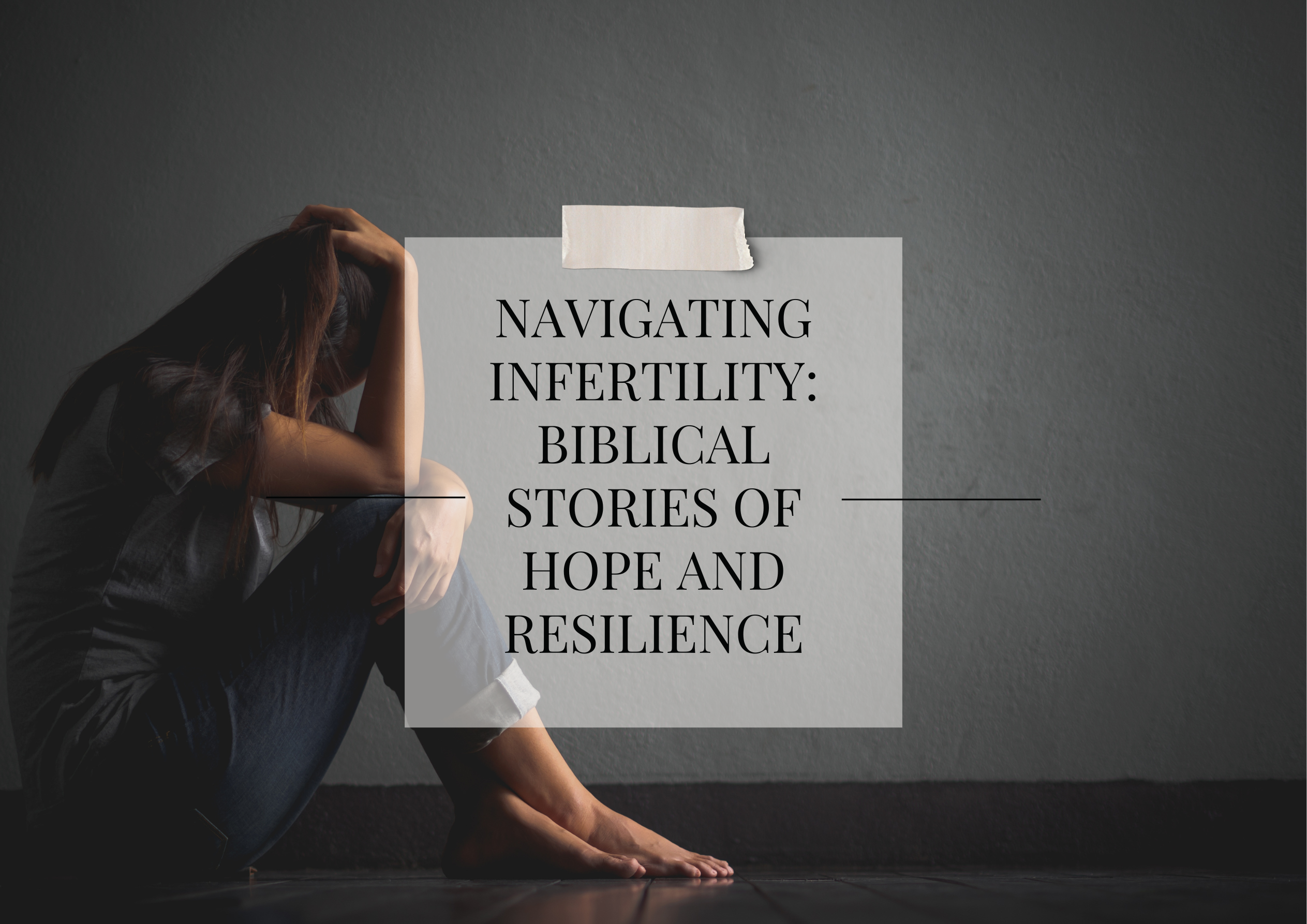Navigating Infertility: Biblical Stories of Hope and Resilience

In the deeply personal journey of infertility, hope often feels as elusive as a flickering flame, tantalizingly close one moment only to vanish the next, leaving behind a crushing sense of disappointment. As someone who intimately understands the agonizing trials of this journey, grappling with its heartaches and unanswered questions, I’ve discovered a beacon of hope within the pages of the Bible. Its stories of resilience in the face of infertility offer invaluable insights and unwavering comfort for individuals facing similar trials today.
Together, let’s embark on a journey through the accounts of remarkable women who confronted infertility with unwavering faith before embracing the miraculous gift of motherhood. These stories are more than historical accounts; they are guiding lights illuminating the path for those stumbling through the darkness. Through our exploration, we’ll not only find comfort but also discover boundless inspiration to endure our own storms and emerge even stronger on the other side.
Sarah: Hope Amidst Uncertainty
Sarah’s narrative, chronicled in the book of Genesis, stands as a testament to God’s unwavering faithfulness amidst the trials of infertility. As the wife of Abraham and matriarch of the Jewish people, Sarah’s longing for motherhood was met with the harsh reality of infertility. Her journey unfolds as a profound testimony of faith amidst doubt and uncertainty.
Sarah’s initial struggle with infertility was marked by profound longing. Despite her deep desire for motherhood, she found herself grappling with anguish and doubt. Desperate and impatient, she resorted to offering her servant to her husband in a misguided attempt to fulfill God’s promise, only deepening her sense of adversity.
Despite doubts and struggles, Sarah remained steadfast in her journey, enduring a prolonged period of waiting and grappling with uncertainty. She questioned whether God’s promise of motherhood would ever come to fruition. However, amidst her uncertainties, Sarah clung to the promise of God, albeit imperfectly, wrestling with her faith and the weight of unfulfilled longing.
Against all odds and well past the years of childbearing, Sarah witnessed the miraculous fulfillment of God’s promise. In her old age, she bore a son, Isaac, bringing immeasurable joy and marking her as the mother of a nation. Through this miraculous event, Sarah’s faith was vindicated, transforming her journey of infertility into a testament of God’s faithfulness.
Sarah’s story reassures readers that God remains steadfast to His promise despite their doubts and struggles. Even amidst prolonged waiting and wrestling with faith, God’s faithfulness transcends human limitations. Through Sarah’s journey, believers find comfort in knowing that God’s plans are always greater than their own, and His timing is always perfect. Despite doubts and struggles, God remains faithful, offering strength and hope amidst uncertainty.
Rebekah: The Power of Unity and Shared Faith

Rebekah’s story in the book of Genesis serves as a profound testament to the power of unity within a couple and the significance of shared prayer in navigating life’s challenges, particularly in the face of infertility.
Rebekah, chosen by Abraham’s servant to be Isaac’s wife, embarks on a journey that symbolizes the continuation of God’s covenant. As she and Isaac face the heartbreaking reality of infertility, their bond strengthens, fortified by a common faith and unwavering trust in God’s plan.
Despite their daunting trials, Rebekah and Isaac exemplify the transformative power of unity within a couple. Their shared struggles become a source of strength as they lean on each other for support, finding solace in their mutual commitment to one another and to God.
One remarkable aspect of Rebekah’s story is highlighted in Genesis 25:21, where Isaac intercedes for his wife, emphasizing their shared faith and reliance on God’s providence. Their joint prayers become a powerful expression of their unity and shared dependence on divine intervention.
Through prayer, Rebekah and Isaac align their hearts with God’s will, finding renewed hope and assurance in His promises. Their journey underscores the vital practice of couples praying together as they seek God’s guidance and provision in their lives.
In essence, Rebekah’s story serves as a poignant reminder that the infertility journey is not meant to be faced alone.
Instead, it is a journey of unity and shared faith, where couples find strength, hope, and resilience in each other and in their collective reliance on God. As they unite in prayer and comradeship, they draw closer to one another and to God, discovering the enduring power of love, faith, and partnership.
Rachel: The Divine Timing of God’s Plan
Rachel, the beloved wife of Jacob, is another key woman in the book of Genesis. Like the women before her, she longed for children but faced infertility.
Rachel’s deep desire for children is overshadowed by the constant reminder of her sister Leah’s fertility. While Leah easily conceives and bears children, Rachel remains barren. As Rachel watches her sister’s children multiplying, her own arms remain empty.
Rachel’s struggle with infertility, though agonizing, was part of a divine plan with far-reaching implications. In God’s perfect timing, Rachel conceived and bore a son named Joseph. Had Rachel conceived immediately, Joseph might have been born at a different juncture in history, missing the pivotal role he was destined to play.
In hindsight, Rachel’s years of longing and waiting were not in vain; they were part of God’s intricate plan to ensure Joseph’s pivotal role in the unfolding narrative of redemption. Strategically placed in Egypt ahead of the severe famine, Joseph rose to prominence as Pharaoh’s vizier, ultimately saving Egypt from starvation and providing refuge for his own family.
Rachel’s prolonged wait for a child wasn’t without divine purpose; it perfectly aligned with God’s plan for Joseph to play a crucial role in history. Positioned ahead of the severe famine, Joseph’s rise to prominence underscored God’s meticulous timing. Rachel’s story teaches us to trust in God’s timing, even when it seems prolonged, knowing that His plans are always for our good and for His divine purposes.
Like Rachel, we are encouraged to persevere in faith, to pray without ceasing, and to anchor our hope in God’s unchanging promises. We know that God’s timing is always perfect and His plans for us exceed our expectations, unfolding in ways we may not anticipate.

Hannah: Embracing Sincere, Unwavering Prayer
Hannah’s story unfolds during a turbulent period in Israel’s history. Amidst the political upheaval and spiritual unrest of Israel during the time of the judges, she demonstrates the transformative power of sincere, unwavering prayer.
Hannah’s heartfelt petitions for a child echo with the ache of her barrenness and the sting of Peninnah, the other wife’s taunts. Despite her circumstances, Hannah turns to God as her refuge, pouring out her heart with raw honesty and vulnerability.
Her prayers, offered in the sanctuary’s silence, become sacred offerings of her deepest desires and anguish. In the stillness of the sanctuary, Hannah finds refuge in the One who hears the cries of the brokenhearted.
With tears streaming down her cheeks and her mouth quivering with emotion, Hannah lays bare her innermost thoughts and desires before the Almighty. In her vulnerability, she bares the depths of her anguish, pleading with God to grant her the blessing of a child.
When Hannah’s grief is mistaken as drunkenness by Eli, the high priest, and he confronts her, Hannah does not cower or back down. Instead, she responds with dignity and grace, boldly declaring her anguish and her unwavering trust in God’s faithfulness. She refuses to be discouraged by Eli’s accusations, choosing instead to cling even more tightly to her belief in the goodness of God.
And then, God answers Hannah’s prayers. She conceives and bears a son, whom she names Samuel, meaning “heard by God.” Through Hannah’s story, we are reminded that God is indeed the God who hears, sees, and answers His Children’s cries, even amid their deepest pain and despair.
Hannah’s example teaches us that prayer has no pretense – no need for eloquence or formality. Instead, she shows us that God welcomes our raw honesty, unfiltered emotions, and most intimate struggles. Hannah’s prayer is marked by authenticity and vulnerability as she bares her heart before the One who sees and knows all things.
Hannah’s fervent prayer life serves as a model for believers today, inviting us to approach God boldly with our deepest desires and struggles, knowing that we will find mercy and grace to help us in our time of need (Hebrews 4:16). Like Hannah, we are invited to pour out our hearts to God, confident that He hears our cries and is near to the brokenhearted.
Through Hannah’s story, we learn that fervent prayer is not just about asking for what we want but about surrendering ourselves completely to God’s will and trusting in His plan, no matter the outcome. In the act of pouring out our hearts to Him, we find strength, comfort, and, ultimately, the peace that surpasses all understanding.
Elizabeth: Faithfulness Amidst Trial
Elizabeth’s narrative in the Gospel of Luke serves as a testament to her steadfast commitment to God, offering a prelude to the birth of Jesus Christ. Alongside her husband, Zechariah, she is described as ‘righteous in the sight of God, observing all the Lord’s commands and decrees blamelessly’ (Luke 1:6, NIV).
Throughout the years of barrenness, Elizabeth remained devoted to her relationship with God, trusting in His promises and obedient to His commandments. Despite societal expectations suggesting barrenness as divine disfavor, Elizabeth prioritized her faithfulness to God. Her unwavering commitment to trusting God’s promises and obeying His commandments persisted, even amidst conflicting cultural beliefs.
Elizabeth’s steadfast trust in God’s promises is not merely passive acceptance but active belief in His faithfulness. Even when the fulfillment of those promises seemed impossible, she remained resolute in her conviction that God is faithful and His word is true.
Elizabeth’s story encourages believers to maintain their devotion to God, placing their trust in His goodness and sovereignty, especially during times of trial. Her narrative reminds us that God orchestrates all circumstances for the good of those who love Him (Romans 8:28), and His plans are always for our welfare, even in the midst of challenging circumstances.

Reflection and Application: Lessons from Biblical Women
Experiencing infertility can be isolating, but finding strength in biblical narratives can provide hope and encouragement. They serve as a reminder that God sees and understands your struggles, working behind the scenes for your greater good. In the midst of my own uncertainties and struggles of infertility, I cling to this promise, finding comfort and reassurance in the faithfulness of God. His love and care for each of us extend beyond our comprehension, offering hope and strength as we journey through this challenging season.
Reflecting on the stories of Sarah, Rebekah, Rachel, Hannah, and Elizabeth, we uncover a recurring theme of God’s unwavering faithfulness amidst trials. These narratives serve as timeless testimonies of perseverance and hope in the face of adversity. Each woman imparts a valuable lesson:
Sarah: Perseverance through Waiting and Doubt
Sarah teaches the importance of trusting in God’s faithfulness during periods of waiting and doubt.
Rebekah: Unity and Prayer in Relationships
Rebekah exemplifies the power of unity within a couple and the significance of couples praying together.
Rachel: Trusting in God’s Timing
Rachel’s story emphasizes God’s perfect timing, revealing His plans that surpass our expectations.
Hannah: Sincere, Unwavering Prayer
Hannah demonstrates the power of openly expressing our deepest emotions to God in sincere, unwavering prayer prayer.
Elizabeth: Remaining Faithful and Trusting in God’s Sovereignty
Elizabeth’s journey highlights the importance of remaining faithful and trusting in God’s goodness and sovereignty.
Practical Tips for Daily Life:
Perseverance Through Waiting and Doubt:
- Cultivate trust in God’s promises by leaning on His faithfulness.
- Seek support from your faith community during challenging times.
- Reflect on past interventions of God to find reassurance in His plans.
Unity and Prayer Within Relationships:
- Prioritize unity in your relationship amidst fertility challenges.
- Set aside time to pray together regularly for guidance and strength.
- Share your burdens and hopes with each other, fostering mutual support.
Trust in God’s Timing:
- Embrace the belief that God’s timing is perfect, even when it differs from your expectations.
- Remain open to unexpected opportunities that align with God’s plan.
- Practice patience and perseverance while waiting for God’s timing to unfold.
Sincere, Unwavering Prayer:
- Approach prayer with honesty and vulnerability, expressing your deepest emotions to God.
- Share your struggles and desires openly with God, trusting in His ability to hear and respond.
- Find comfort and strength by pouring out your heart to God in prayer.

Remaining Faithful and Trusting in God’s Sovereignty:
- Draw strength from God’s promises during times of uncertainty.
- Trust in God’s goodness and sovereignty, knowing that He works all things together for your good.
- Stay faithful to God’s plan, even when circumstances seem challenging or bleak.
By applying these biblical lessons, you can navigate infertility challenges with resilience, hope, and unwavering faith.
Conclusion:
In conclusion, the narratives of Sarah, Rebekah, Rachel, Hannah, and Elizabeth offer profound lessons of hope and resilience amidst the challenges of infertility and motherhood. Each woman’s journey showcases God’s unwavering faithfulness, His perfect timing, and the transformative power of steadfast faith.
Sarah’s story teaches us the importance of perseverance through doubt and trusting in God’s faithfulness, even in the midst of uncertainty. Rebekah exemplifies the significance of unity within relationships and the power of shared prayer, reminding us that we are not meant to face our trials alone. Rachel’s experience underscores the divine timing of God’s plan, showing how our periods of waiting are purposeful and aligned with His greater purpose.
Hannah’s example of sincere, unwavering prayer encourages us to pour out our hearts to God with authenticity and vulnerability, trusting in His ability to hear and answer our cries. Elizabeth’s faithfulness amidst trial demonstrates the importance of remaining steadfast in our trust in God’s goodness and sovereignty, even when circumstances seem bleak.
To those grappling with infertility or struggling on the path to motherhood, I extend a message of hope and comradeship. You are not alone in your journey. Trust in God’s timing, remain steadfast in your faith and hold onto the assurance that He is working all things together for your good.
Moreover, If you need extra encouragement in this journey, I’ve created a free 8 day devotional titled “Blossoming in the Waiting“. This devotional is specifically designed to uplift and inspire those facing infertility. It provides daily reflections and encouraging scriptures to help you find peace, strength, and purpose in your journey.
May the stories of Sarah, Rebekah, Rachel, Hannah, and Elizabeth serve as a source of strength and inspiration as you journey through the complexities of infertility and motherhood. May you find comfort in knowing that God is with you every step of the way, guiding you, sustaining you, and ultimately fulfilling His promises in His perfect timing.

- Reflect on a time when you experienced doubt or uncertainty in your life. How did you navigate through those feelings? What lessons can you draw from Sarah’s journey of perseverance through doubt?
- Consider the importance of unity within your relationships, especially during challenging times. How do you and your partner support each other in times of difficulty? Reflect on Rebekah’s story and discuss how you can implement the power of shared prayer in your relationship.
- Think about a situation in your life where you had to wait for something you deeply desired. How did you cope with the waiting period? Reflect on Rachel’s experience of trusting in God’s timing and discuss ways you can apply this trust in your own life.
- Recall a time when you poured out your heart to God in prayer, expressing your deepest emotions and desires. How did you feel during and after that prayer? Reflect on Hannah’s story of sincere, unwavering prayer and consider how you can cultivate a similar prayer life.
- Reflect on a moment when you faced a challenging situation that tested your faithfulness and trust in God. How did you remain steadfast in your belief during that time? Draw insights from Elizabeth’s journey of faithfulness amidst trial and discuss ways to strengthen your faith in God’s goodness and sovereignty.




